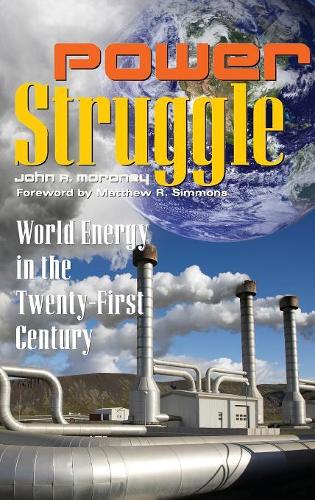
Power Struggle: World Energy in the Twenty-First Century
(Hardback)
Publishing Details
Power Struggle: World Energy in the Twenty-First Century
By (Author) John R. Moroney
Bloomsbury Publishing PLC
Praeger Publishers Inc
30th May 2008
United States
Classifications
General
Non Fiction
333.79
Physical Properties
Hardback
208
Description
Can catastrophic climate change in this century be averted without strangling the world economy and global aspirations for improved living standardsboth of which depend on the continuing prominence of fossil fuels in the 21st century Power Struggle: World Energy in the Twenty-First Century argues that it can. Moroney demonstrates that energy is the cornerstone of world civilization and global economic growth by measuring the tight coupling between energy per capita and real standards of living. Fossil fuels-oil, natural gas, and coal-today account for 88 percent of world energy. The author shows that renewable energies such as solar, wind, ethanol, and biodiesel cannot be deployed to replace fossil fuels on a globally significant scale within the next 50 years. Fossil fuels, he maintains, will continue to dominate world energy for the next half-century, in spite of the coming severe depletion of world reserves of conventional oil and gas. But since the burning of fossil fuels is the principal source of carbon dioxide emissions, which are in turn the principal source of global warming, how can catastrophic climate change be avoided The solution to the dilemma, says Moroney, is to capture and permanently store most of the carbon dioxide emitted by the human race. Half of all human CO2 emissions originate in 8,000 electric power plants, refineries, steel mills, and other manufacturing facilities around the world. The technology is at hand to capture the CO2 emissions from these big plants and store them, permanently and harmlessly, in geological traps and the deep ocean, instead of releasing them into the atmosphere. Coal-fired power plants with near-total capture of CO2 emissions will become operational in the United States and Western Europe as early as 2012. If the world is to thread the perilous straits of economic and climate catastrophe, international cooperation and capital investment on a scale unprecedented in human history will be required. Power Struggle marshals the most important facts concerning world energy reserves: where oil, natural gas, and coal, and uranium reserves are located; how long they will last at projected rates of consumption; and why the most prosperous countries of the world will increasingly rely on oil and natural gas imports from the Middle East and Russia. Moroney shows why it is reasonable to expect that unconventional oil and gas sources such as heavy crude oil, tar sands, and oil shale will come on stream as feasible long-term substitutes for the world's depleted reserves of conventional oil and gas.
Reviews
In this solid, if pedestrian, survey of world energy issues, Moroney (economics, Texas A&M Univ.) argues that oil, natural gas, and coal--fuels now representing 85 percent of all energy consumed around the globe--will continue to dominate despite predicted depletion of world reserves. * Library Journal *
Moroney believes fossil fuels will continue to be the major energy sources for at least another 50 years and that carbon sequestration should be considered as an immediate approach to global warming. This would be an attainable goal because half the world's CO2 emissions are concentrated in approximately 8,000 large plants and could be captured on site. Moroney presents his case accessibly, with much statistical support,Recommended. Lower-division undergraduate through professional collections * Choice *
Author Bio
John R. Moroney is Professor of Economics at Texas A&M University. He has been a visiting professor at the Massachusetts Institute of Technology, the University of Melbourne, Simon Fraser University, and the Instituto Technologico y de Estudios Superiores de Monterrey. He has held research posts with the National Science Foundation, the National Academy of Sciences, and the National Academy of Engineering. He is the author of thirteen books on energy issues. His policy recommendations concerning energy and sustainable development were endorsed by Mexican President Calderon.
